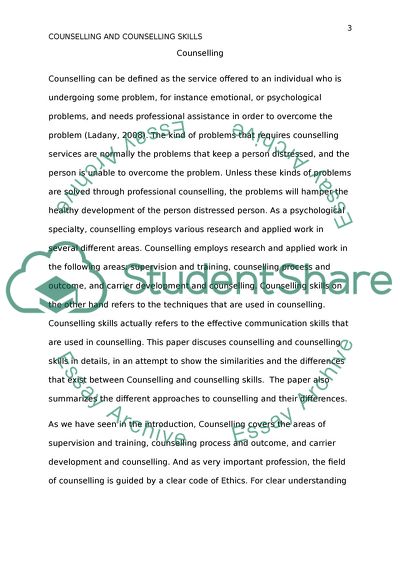Cite this document
(Counselling and Counselling Skills Term Paper Example | Topics and Well Written Essays - 2095 words, n.d.)
Counselling and Counselling Skills Term Paper Example | Topics and Well Written Essays - 2095 words. Retrieved from https://studentshare.org/psychology/1813073-evaluate-and-reflect-on-what-counselling-is-and-explore-theoretically-and-reflectively-the-differences-that-exist-between-counselling-counselling-skills-and-other-forms-of-helping
Counselling and Counselling Skills Term Paper Example | Topics and Well Written Essays - 2095 words. Retrieved from https://studentshare.org/psychology/1813073-evaluate-and-reflect-on-what-counselling-is-and-explore-theoretically-and-reflectively-the-differences-that-exist-between-counselling-counselling-skills-and-other-forms-of-helping
(Counselling and Counselling Skills Term Paper Example | Topics and Well Written Essays - 2095 Words)
Counselling and Counselling Skills Term Paper Example | Topics and Well Written Essays - 2095 Words. https://studentshare.org/psychology/1813073-evaluate-and-reflect-on-what-counselling-is-and-explore-theoretically-and-reflectively-the-differences-that-exist-between-counselling-counselling-skills-and-other-forms-of-helping.
Counselling and Counselling Skills Term Paper Example | Topics and Well Written Essays - 2095 Words. https://studentshare.org/psychology/1813073-evaluate-and-reflect-on-what-counselling-is-and-explore-theoretically-and-reflectively-the-differences-that-exist-between-counselling-counselling-skills-and-other-forms-of-helping.
“Counselling and Counselling Skills Term Paper Example | Topics and Well Written Essays - 2095 Words”, n.d. https://studentshare.org/psychology/1813073-evaluate-and-reflect-on-what-counselling-is-and-explore-theoretically-and-reflectively-the-differences-that-exist-between-counselling-counselling-skills-and-other-forms-of-helping.


